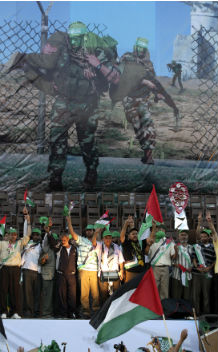New Dangers and Challenges After Shalit
More on:

PLO chairman Mahmoud Abbas returned to Ramallah last month from New York triumphant, having defiantly stood up to the United States and others by submitting Palestine’s application for statehood to the United Nations Security Council. Yesterday, in contrast, Abbas doubtlessly felt politically deflated as he welcomed newly freed prisoners whose release was engineered by his two political adversaries--Hamas and Israel.
Such are the vagaries of rapidly shifting Israeli-Palestinian politics. One moment Abbas is up, the next he feels compelled to host his rivals’ supporters whose violent actions ran precisely contrary to his own political approach. Last week I provided a first look at the immediate implications of the Shalit exchange. Now, as the dust settles further from the drama of the prisoner exchange, certain realities come into clearer focus:
First, despite the increased flexibility just demonstrated by both Israel and Hamas in closing the deal, the prisoner exchange does not presage a new peace opening between the two bitter foes as some suggest. The Gaza-Israel border just became even more dangerous. Hamas and other radical groups have called for additional kidnappings of Israeli soldiers and settlers to serve as bargaining chips. And senior Israeli military officers have begun ordering their soldiers not to be taken captive alive, even if that means injuring or killing their fellow comrades in arms to thwart a Palestinian abduction operation.
At a more strategic level, Israel will probably seek to reestablish its deterrence and military supremacy vis-à-vis Hamas. This means Israel will strike heavily against targets in Gaza should militant groups there launch projectiles into Israel or appear to be preparing any abduction operations against Israeli targets.
Second, the prospects for serious Israeli-Palestinian peace talks are, if anything, dimmer in the period ahead. Recall, Abbas’s request for statehood has not gone away, and is making its way through the Security Council bureaucracy. Should it come to a vote, the Palestinians will either fail to get the necessary nine votes in favor, or the United States will veto it. In either case, a defiant Abbas will feel even more inclined to take it to the United Nations General Assembly and the certain attainment of non-member statehood status. This will likely trigger a strong Israeli (and possibly American) counter reaction that will hardly grease the wheels for renewed talks. Such UN actions, and possible Israeli counter responses, increase the prospects for renewed Israeli-Palestinian violence on the ground.
Third, popular sentiment is once again pushing Palestinian leaders across the Hamas-Fatah divide to renew their unity efforts. Wide-scale demonstrations in March in both Gaza and the West Bank precipitated last spring’s Fatah-Hamas unity deal. There is a simple reason the deal was not adopted: neither Hamas’s nor Fatah’s leaders really want it. Hamas is happily ensconced controlling Gaza, and Mahmoud Abbas’s people exclusively control the West Bank. Neither particularly wants to share with the other. This will be all the more the case after the prisoner exchange. Nonetheless, both sides will go through the motions of further reconciliation talks to appease public opinion.
Still, important opportunities exist for improving the situation through creative action. First, Quartet envoys are set to meet next Wednesday in Jerusalem with Israeli and Palestinian representatives as called for by the Quartet’s September 23 statement laying out stepping stones to and a timeline for resumed negotiations. These diplomats have their work cut out for them. It is still imperative, in light of the increasingly volatile atmosphere, that a pathway be created back to negotiations.
But the Quartet’s September 23 statement also called for the diplomats to “consult and identify additional steps they can actively support towards Palestinian statehood individually and together.” In other words, the international community should focus not just on diplomacy but also on the more fruitful state-building actions that Prime Minister Fayyad has shepherded over the past three years. This focus on building Palestinian capacity has produced significant economic growth and reduced donor dependency as recognized by the World Bank, IMF, and other international bodies. Accountable and effective Palestinian security services have made the streets of once no-go areas like Jenin, Nablus, and Hebron safe for Palestinians. And it has created effective Israeli-Palestinian security cooperation—the sine qua non for real diplomatic progress.
In light of emerging political challenges and increased volatility, now is not the time for benign neglect. The international community, along with Israel and the Palestinian Authority, should focus on rapid, practical, on-the-ground steps to help mitigate increasing dangers resulting from the Israel-Hamas prisoner exchange. A new window of opportunity for peace has not opened. But preventing a potentially explosive situation is important while the parties’ immediate priorities are focused on areas other than diplomacy.
More on:
 Online Store
Online Store